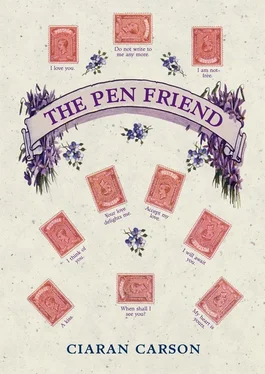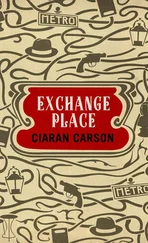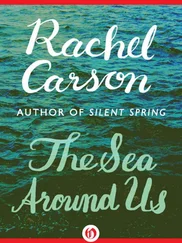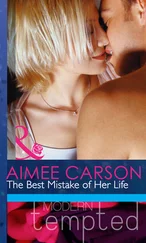And what happened to the other chap? I said. Oh, said Beringer, brash youth, he’s shitting himself, pistol all over the place, but he manages to get your man in the leg. Wound went septic, had to amputate. Chap’s a cripple for the rest of his life. Most unfortunate, really, brash youth was in the wrong, chap hadn’t been looking at his woman at all. But then there’s never really much justice in these things, is there?
So there I was in Beringer’s shop and I said I was looking for something special. For a lady. Lady friend? said Beringer. Well, acquaintance, I said, and Beringer gave me the ghost of a wink. Well, he said, maybe you wouldn’t want to get too close then. A pendant wouldn’t do. Certainly not a ring. Nor earrings. Now here’s something — and he pulled open a drawer and took out a scent bottle — Lalique glass, he said, lovely thing, L’Air du Temps by Nina Ricci, 1948. He handed me the bottle. It was indeed lovely, with a swirled bowl of pale yellow, the stopper in the form of two intertwined doves in opalescent frosted glass. Yes, said Beringer, L’Air du Temps , Spirit of the Times, just after the war, you know. Love and peace, that kind of thing. Of course it’s empty, but you can still smell the perfume. I unstoppered the bottle and put my nose to its mouth. Sandalwood, rose and jasmine breathed out at me. I thought of the paintings of Botticelli, of Venus emerging from the waters on her scalloped shell. So I bought the bottle, and I gave it to you. Of course you knew what it was at once, and you were delighted. L’Air du Temps by Nina Ricci, 1948, the year my parents married. The Lalique bottle came later, 1950. Thank you so much, Angel, do you know I used to call myself Nina when I was a child, because Miranda was such a mouthful, and my father called me Nina, though my mother would insist on Miranda. So you became Nina then, and you are Nina still to me. And I wonder if you still have the L’Air du Temps bottle, and if its perfume still lingers.
When two similar and unlikely, or at least unexpected, events happen in relatively quick succession they achieve a certain equilibrium, a reciprocity: they are the two sides of an equation, and complement each other, like Yin and Yang. So it was with your first two messages: It’s been a long time, It’s easy to remember . But three? Three is a perfect number, the triangle of the Trinity, but triangles are notoriously tricky in human relationships, and I think again of the little accidental minuet we danced with Tony Lambe when I heard him call you Miranda. Nina. I write your name again this time in order to address you. Your third postcard was postmarked Stroud, Gloucs., a name which meant little to me. I looked it up in the atlas and found it to be a small town on the Welsh border, not far from Bristol, and I wondered what you were doing there. But then I used to wonder what you were doing wherever you were when you were not with me, when you were not in Belfast, away on one of your trips.
Stroud meant nothing to me, but the image on the postcard brought tears of recognition to my eyes. Belfast 1954 , the caption on the back reads, John Chillingworth, © BBC Hulton Picture Library . It shows a back street in Belfast. It could be Sevastopol Street, where I spent the first six years of my life before we moved to Ophir Gardens, but it is not. Nevertheless this grey pavement is familiar to me, the corner shop, the lamp-post, the water running down the pavement from a broken gutter. 1954. I would have been five or six. I could be one of these five boys in the foreground, wearing wellington boots, or I could turn a corner and appear in the picture any time soon. A game is in progress, Cops and Robbers or Cowboys and Indians, for the smallest two of the boys are wielding toy guns, drawing in on a third who is hidden from their view by a street corner; a fourth, evidently a passer-by and not part of the game, looks at the fugitive with amusement, and, from the eager expression on the face of the leading gunman, seems to have given the game away; the fifth boy, who might or might not be involved, is looking elsewhere. And I wonder what this little drama, so accidental, so inevitable in outcome because seen in retrospect, might have to say about our relationship.
I turn the card over. It took me a few readings of your brief message before I realised the link between it and your preceding one. But so hard to forget , those were your words, and suddenly I heard Billie Holiday singing, as you must have intended. It was you who introduced me to Billie Holiday.
Your sweet expression, the smile you gave me,The way you looked when we metIt’s easy to remember, but so hard to forgetI hear you whisper, I’ll always love you,I know it’s over and yetIt’s easy to remember, but so hard to forget.
And more than that, I heard her singing my favourite Billie Holiday song, as you must have intended, ‘Gloomy Sunday’. It’s playing on the CD player as I write, and I am hearing it, not now in my study at 41 Ophir Gardens, but in your flat at 70 Eglantine Avenue as I heard it over twenty years ago; for music, like perfume, has the power to abolish intervening time. The flat is more of a maisonette, the two top floors of a big three-storey Victorian house. We’re sitting in what would have been the drawing-room. It’s summer dusk, the curtains of the great bay window have not yet been drawn, and a tree bows and scrapes against the glass in the breeze which rises at dusk when the air grows chill; there’s a bright fire burning in the grate. The only other light is the deepening amethyst of the sky beyond the trees and a dim lamp which shines on the hi-fi system. There’s a gleam on the black undulating disc like silvery moonlight on a black ocean, and Billie’s voice emerges from the speakers the ghost of a beat ahead of the backing, but slowly, skimming above the melancholy horns, dipping and soaring then slowing as she pauses on the last word of a line before letting it go into a temporary silence, and the band comes to the foreground for a second or two, echoing the phrase before last, then fades back behind her.
Sunday is gloomy, my hours are slumberlessDearest, the shadows I live with are numberlessLittle white flowers will never awaken youNot where the black coach of sorrow has taken youAngels have no thoughts of ever returning youWould they be angry if I thought of joining you?Gloomy Sunday.
And I see the drawing room in its entirety, the big Kazak rug, faded reds and yellowed greens on the black-painted floorboards, the shelves of books, the framed Japanese fans, the Art Deco dressing table. You had another in the bedroom; this one was more of a display unit for your collection of scent bottles. I hadn’t known, when I bought you the L’Air du Temps bottle, that you were a collector, and it pleases me to see its pair of intertwining doves here now, even if perhaps you only brought it out because you knew I was coming. Either way, you had me in mind. On the dressing table you’ve arrayed bottles of cut glass and blown glass and marble-swirl glass and opalescent milk glass and Limoges porcelain and rose quartz and green opaline, square-shouldered bottles and round bottles and cylindrical bottles, bottles with stoppers of ruby glass and silver and guilloche enamel and diamond-faceted glass, stoppers in the shape of lilies and roses and pineapples, bottles shaped like pineapples and translucent pears and apples. Here is an especially beautiful one, with a reverse-painted Japanese scene showing two boys playing hide-and-seek. There are bottles shaped like domes and spires and cupolas, ranged like the buildings of a city reflected in the triptych mirror of the dressing table, glowing and winking in the firelight. Then there are the accessories, the atomizers with beaded bulbs and the hairbrushes with tortoiseshell backs, the enamelled powder compacts. I asked you what drove you to collect these things, and you said, Because they’re beautiful, and as I write these words I think of my own collection.
Читать дальше












